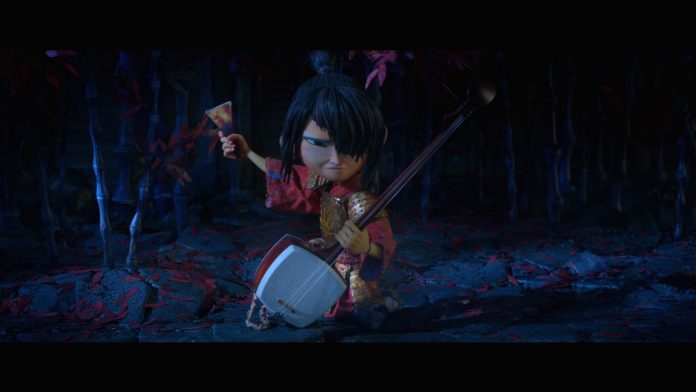The few imperfections don’t even come close to overshadowing what will surely be a classic
Kubo and the Two Strings is the best movie I’ve seen all year. The points where it stumbles are unfortunate, but they’re surrounded by such excellence that you’re still bound to have a good time.
Kubo is the directorial debut of animator Travis Knight, and was created by Laika, a studio best known for 2009’s Coraline. While that film wore its stop-motion puppetry style on full display, Kubo seems to be assembled with care to maintain the aesthetic while cutting down on the jarring jumpiness of the animation. The result is a gorgeous, immersive, and incredibly detailed storybook world.
But unlike Coraline, Kubo is an original story which proudly takes influence from myths and legends to weave something that immediately feels like a forgotten childhood tale. The film centres squarely on Kubo (voiced by Art Parkinson), a boy in ancient Japan with a magical, musical gift. With the power to form impossibly detailed origami figures and bring them to life by playing his shamisen (a traditional Japanese lute), he supports his unwell mother by entertaining a rural village with stories of heroics and daring. Of course, it isn’t long before he’s swept into a quest of his own, finding companions in a talking monkey (Charlize Theron) and a cursed samurai (Matthew McConaughey). Pursued by a pair of intensely creepy birdlike women (Rooney Mara), they begin their search for a set of mythical armour, supposedly the only defence Kubo has against his hunters.
While the plot may come across as clichéd, its execution is engaging throughout. The story feels like a fable or a Grimm fairy tale, and the Japanese setting helps it stand out from countless similar European stories. The few plot holes and contrivances were well-hidden and matched the tone of the film, minimizing their visibility.
Unlike most other animated movies ostensibly aimed at children, Kubo also isn’t afraid to take its time. The pacing is impeccable. The film crams so much into its 102-minute runtime that I was sure it passed two hours, yet it finds the time to let the characters sit down, catch their breath, and talk at length. Combined with the relatively small cast, this lets viewers connect more deeply with the characters and their relationships than, for example, this year’s Zootopia did. The filmmakers are patient, so the film doesn’t come off as just hitting plot points — it doesn’t feel like a constant rush to reach the next giant monster or mood-lightening joke.
Speaking of jokes, the comedy aspects are Kubo’s biggest failing. Some jokes certainly DO land, but there were at least just as many that seemed out of place and completely unfitting with the tone. A melancholy adventure like this needs its moments of levity, but having George Takei deliver his signature “Oh my!” took me out of the experience. Interestingly, the film seems to acknowledge this. In an early scene, before one of Kubo’s performances, his friend urges him to include a fire-breathing chicken in the story. She explains that if he makes his audience laugh, they’ll come to his show and throw more coins his way. Whether that indicates that the jokes were forced in to market the movie, or if this was just the writers’ way of explaining their decision, it does feel like a subtle acknowledgement of the film’s primary failing.
The other main issue that weakens Kubo in a very different way is the casting. Don’t get me wrong, the actors individually are all excellent. Parkinson, best known for his role as Rickon Stark in Game of Thrones, proves that he is a far more capable actor than that role showed. Theron provides the remaining emotional core convincingly, leaving McConaughey to tackle most of the aforementioned out-of-place comedy, and doing well with what he’s given.
The issue is that none of those actors, nor any that affect the story in a meaningful way, are actually Japanese. For a story set in ancient Japan, that’s not just disappointing, it’s baffling. With Hollywood’s whitewashing a hot topic these days, it’s hard to believe the filmmakers were so desperate to cast the least interesting Stark that they couldn’t even match the representation Mulan managed almost 20 years ago.
That said, it would be almost criminal of me to finish this review on a down note and not mention the music. While much of it is a decent but unremarkable orchestral score, whenever Kubo pulls out his shamisen and begins to play, the soundtrack picks up to a roar with catchy, intense music underscoring those pivotal moments. The film closes with a fantastic cover of “While My Guitar Gently Weeps” performed by Regina Spektor that I’ve listened to more times than I care to admit since leaving the theatre.
In the end, if you can get past the problematic casting and a few out of place jokes, Kubo and the Two Strings has a ton to offer viewers of any age. The solid performances draw viewers into the surprisingly emotional, perfectly paced adventure and the creepy yet gorgeous visuals make this soon-to-be classic pop off the screen. You won’t regret taking the time to see this one.
Jeff was The Cascade's Editor in Chief for the latter half of 2022, having previously served as Digital Media Manager, Culture & Events Editor, and Opinion Editor. One time he held all three of those positions for a month, and he's not sure how he survived that. He started at The Cascade in 2016.

